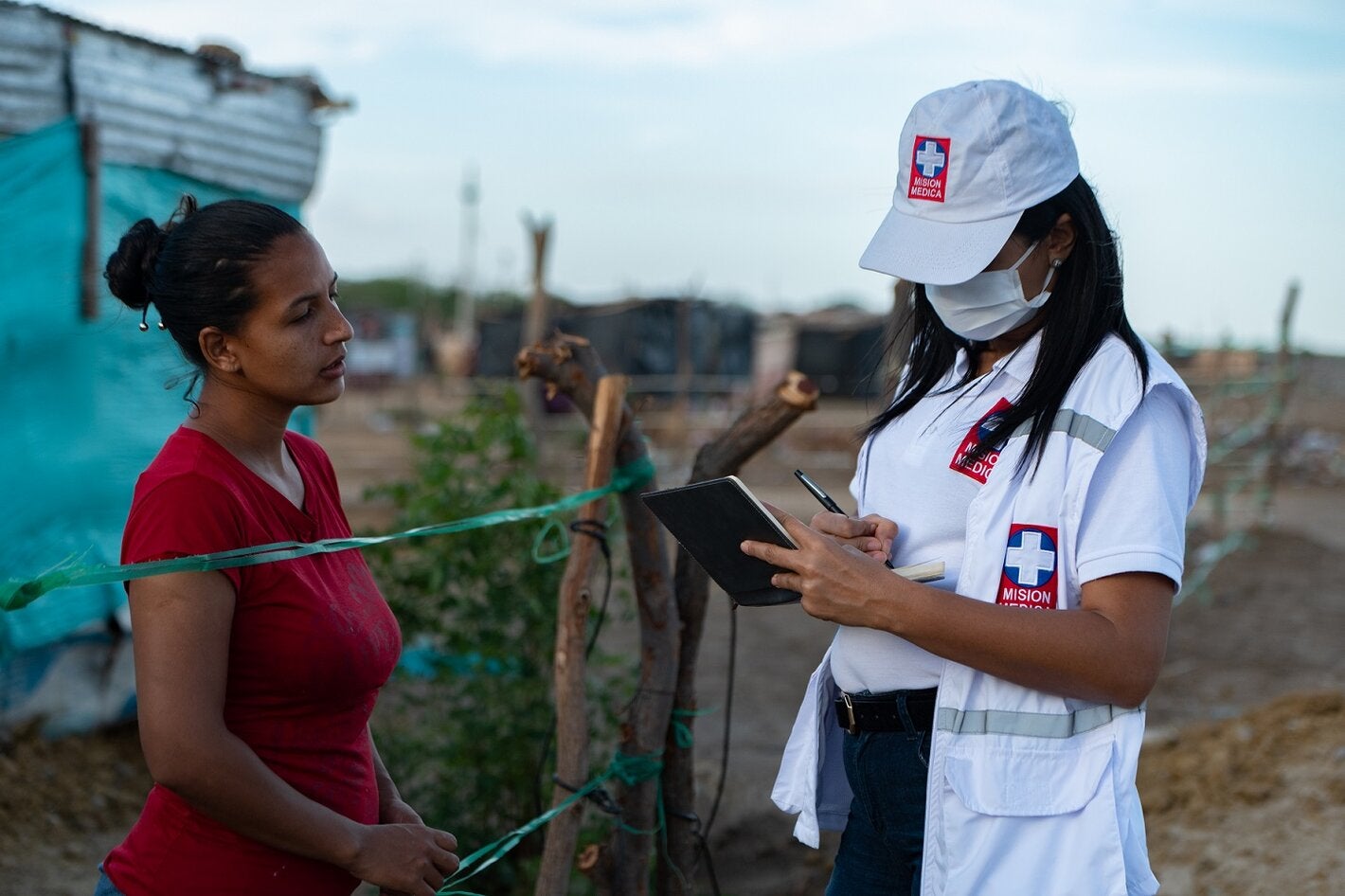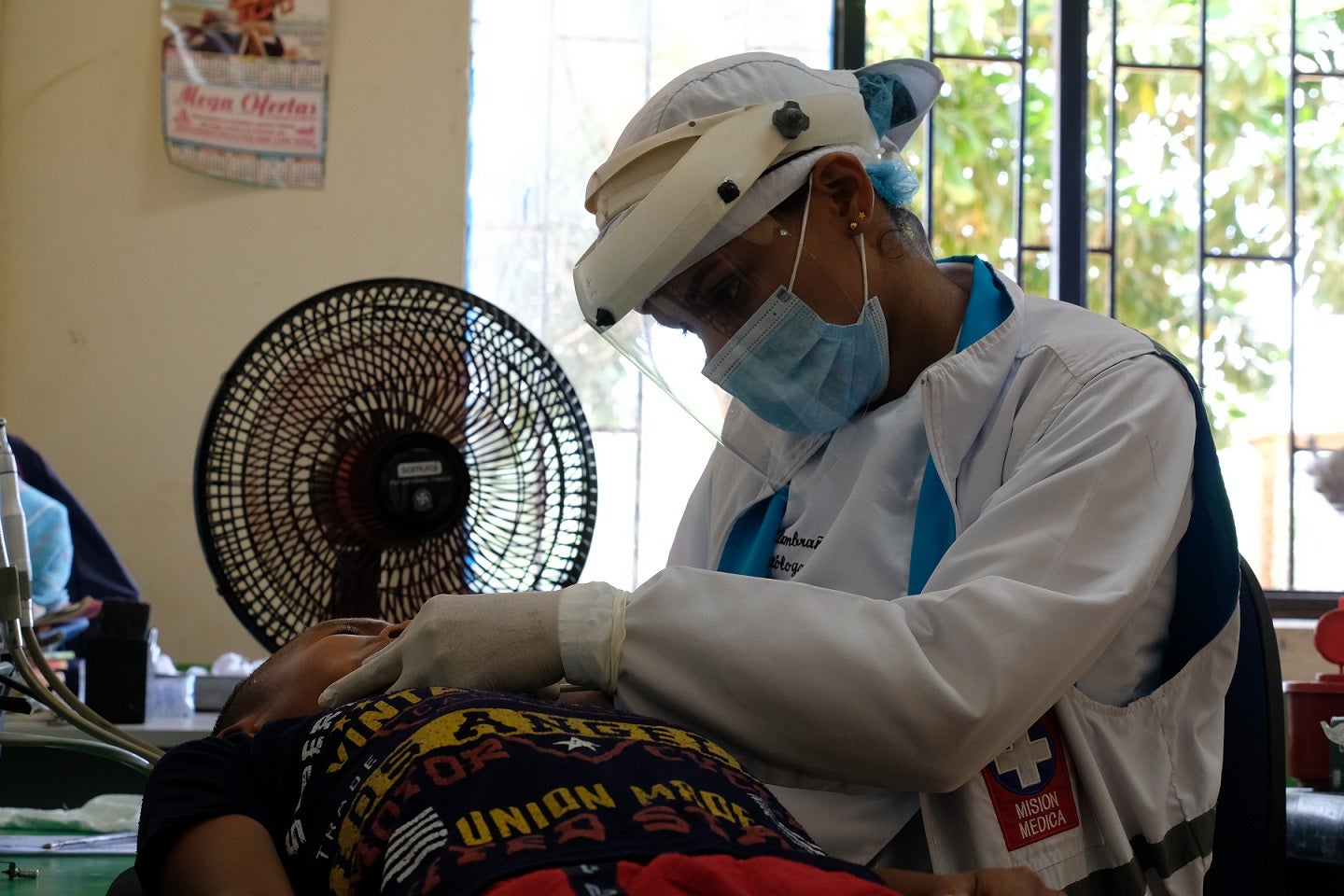
Health workers in Colombia face enormous challenges in providing care in areas of armed conflict. On World Humanitarian Day, let us celebrate their courage and unite to ensure their protection and respect.
Bogotá, 19 de August, 2024. — On October 29, 2023, María Daniela Ordóñez experienced one of those days - sadly common - for health personnel working in areas affected by violence in Colombia. On that day, while elections for governors, mayors and councilors were being held, what for María Daniela began as a normal day of her social service as a doctor in Barranca de Upía, department of Meta, turned into chaos when a patient injured in a street fight arrived at the hospital.
At that moment, the health center became a battlefield. A group of twenty armed people burst in with the intention of killing the patient. Maria Daniela, along with a handful of nurses, took refuge in the hospital bathroom. There, in that confined space, time stretched out in a seemingly eternal wait, on the thin line between duty and risk.
That same day María Daniela left Barranca de Upía, physically and emotionally affected; and became one more of the health professionals who are victims of violence as they struggle to save lives in Colombia.
María Daniela's experience is not an isolated case. Data from the Medical Mission National Platform (Mesa Nacional de Misión Médica, in Spanish) reveal an alarming reality: in Colombia, health personnel have become a frequent target of violence. Attacks in the year 2023 reached unprecedented numbers, since records have been kept. In that period, 511 attacks against health care were recorded. The departments with the highest number of cases were Antioquia, Cundinamarca, Tolima, Cauca and Nariño.
“The occurrence of threats, homicides, physical and mental injuries and even forced displacement of health personnel, as well as damage to infrastructure, vehicles, equipment and supplies, and the blockage of health activities, limit the provision of health services. These situations, in addition to causing the loss of human lives and physical and psychological injuries, deteriorate the health and well-being of the affected populations due to the lack of medical care and the timely availability of equipment, medicines and medical transport,” said Dr. Gina Tambini Gómez, PAHO/WHO representative in Colombia.
Due to this context, the Medical Mission was created in Colombia more than 20 years ago as a mechanism for the protection of health personnel against attacks, by means of a protective emblem, rights, duties and care routes. The Medical Mission is a fundamental pillar for the care of people in situations of armed conflict, natural disasters and other humanitarian emergencies, where health and life are at risk.
The Medical Mission is led by the Office of Territorial Management, Emergencies and Disasters of the Colombian Ministry of Health and Social Protection, with the participation of the International Committee of the Red Cross (ICRC), the Colombian Red Cross and the Pan American Health Organization/World Health Organization (PAHO/WHO).
The resilience of health care workers
Behind each one of the attacks there are stories of fear, uncertainty and the struggle to save lives in an adverse context. Beatriz Borges Salinas, manager of the public health center Chayit Seyú, located in the north of the department of Cauca, recalls how she has had to face events between armed groups and the military forces in one of the municipalities.
“One of the moments that has marked me the most occurred several years ago, when wounded people from the public forces and also from the armed groups arrived at my hospital. Even there, in the hospital infrastructure, there was a confrontation, a crossfire, and we, as health personnel, were trying to attend to the sick and wounded patients, from our neutrality and impartiality, observing and feeling how the projectiles passed over us while we were trying to save lives. It was, without a doubt, one of the experiences that has marked me the most.
In Colombia, some health professionals, after being directly affected by the armed conflict, continue to practice their profession with a vocation of service and passion, motivated by the desire to help communities. “In Cauca, the sense of belonging and commitment, despite the adversities, is very strong,” adds Borges. “Patients have even become community health agents, forming a support network that has allowed us to survive over time, considering the difficult context we face every day.
This is how, despite this challenging context, hope remains among health workers. “I like to think that in the future health personnel will be able to do their work without fear, attend to patients without fear, help the population without fear and return home without fear,” expresses physician Pier Paolo Aaron, who witnessed the kidnapping of one of his colleagues by an armed group to assist one of their members. Today, Dr. Aaron continues to serve in a hospital in Funza, Cundinamarca.
Caring for the Medical Mission is essential as it provides services to safeguard the lives and well-being of communities in times of crisis. It is these health workers who, day in and day out, help, care for and attend to those who need it most and whose lives are at risk.
Now it's our turn: let's protect these health heroes, let's push for respect for their work, and on this World Humanitarian Day, let's pledge to defend their right to work in a safe environment. Many people's lives depend on health workers being able to do their work without fear. Let's act now!
About Medical Mission
The Medical Mission National Platform promotes respect and protection of the Medical Mission through the articulation of institutional and intersectoral actions, developing mechanisms to prevent and mitigate the risk of violence against health personnel. In the territories, the creation of departmental and/or district medical mission tables has been promoted, which in some cases are already in operation. These committees are made up of the same institutions and entities, with the participation of their local representatives.




